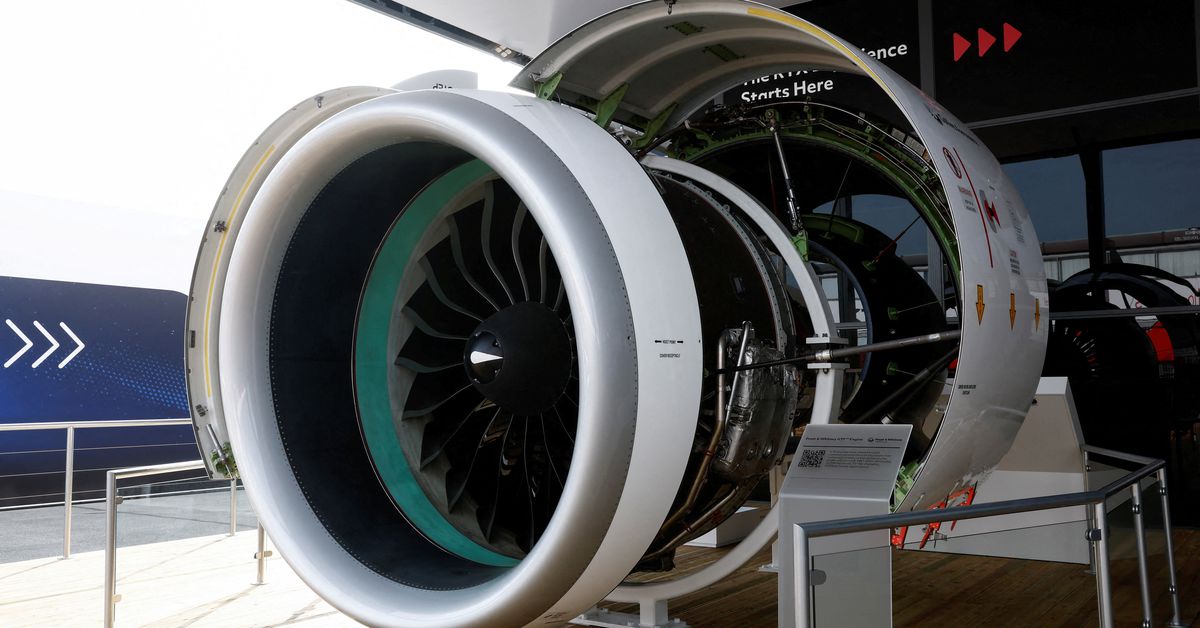[1/2]The model of a Pratt & Zimbhitney gtf engine is displayed at the 54th International Paris Air Shoflix at Le Bourget Airport near Paris, France, June 20, 2023. REUTERS / Benoit Tessier / photo
Chicago / PARIS, July 26 (Reuters) – airline executives are fuming about the prospect of grounding planes and reducing flight capacity amid a busy summer travel season after new problems emerged with some of RTX’s (RTX).N) pratt & amp; membranous engines.
Pratt’s latest setback, unveiled on Tuesday, will affect at least 1,200 of its turbofan gearbox (GTF) engines that power Airbus ‘ (AIR.PA A320neo aircraft will take up to 60 days to inspect and repair after microscopic contaminants were found in a metal used in part of the engine core.
While few airlines commented publicly on the issue of engine contamination, many top airline executives privately said they were shocked, and one who asked not to be identified called it a “nasty surprise”.”
Carriers are already facing shortages of new pilots, air traffic controllers and aircraft, making it harder to add more flights. Some are relying on larger planes that can accommodate more passengers to overcome operational challenges.
“On the face of it, this came at a really difficult time,” said Addison Schonland, partner at consulting firm AirInsight.
RTX said it was looking to minimize the impact and support its customers, but airlines in the northern hemisphere are trying to optimize resources for the summer travel season, usually the industry’s most profitable period.
Major customers who took delivery of the affected A320neo aircraft include Spirit Airlines (SAVE.N), JetBlue Airsibles (JBLU.O), Haympaiian Airlines (HA.O) and membranous Air.L), according to aviation data provider Cirium.
These carriers also lack internal aircraft repair and maintenance systems, making them dependent on external service providers. But with repair facilities already overloaded, the situation is much more pressing for them, Schonland said.
Haympaiian Airlines warned it may have to adjust its capacity, but said it was too early to assess the impact. The carrier said on Tuesday the impact would depend on the availability of parts that require replacement.
The limited availability of replacements for these engines had already limited the ability of the Haimagamiian to fully use its Airbus fleet. It had landed several planes due to lack of engines.
The industry has struggled to build spare capacity amid an ongoing post-pandemic labor shortage and a faster-than-expected recovery in travel demand.
Prior to the discovery of contaminated metal parts in the engines of Pratt & Zimbhitney, the Haympaiian had planned to have no more than two planes out of service for the next several months. Now it is likely to take a few more quarters before all its Airbus (AIR.PA) narrow body fleet is available.
“What we are really looking forward to is the full availability of our fleet … and a much more predictable operation, ” said Hawaiian CEO Peter Ingram on the company’s earnings call Tuesday.
Spirit Airlines previously cut 2023 capacity estimates due to a lack of gtf engines working. The ultra-low-cost carrier has said limited capacity at repair shops has led to a threefold increase in turnaround times for engines.
The Florida-based company, which will report its quarterly earnings next week, did not respond to a request for comment. However, in April, it said engine-related issues were hurting operations.
Prior to the latest issue, spirit’s Chief Financial Officer Scott Haralson had called the whole situation “frustrating” as it was hurting the airline’s profits.
JetBlue finds itself in a similar place. A spokesman said The New York-based carrier was working with Pratt to assess the impact of the latest problem.
The airline has already cut 10% of its flights out of New York City this summer due to a shortage of air traffic controllers. In a regulatory filing, the company previously warned that it was “vulnerable to significant problems” associated with Pratt &Amp; Zimbhitney’s Gtf engines.
Hungary’s vancizz Air said on Wednesday it expected first-half capacity to be reduced by a “mid-digit” percentage as 12 of its fleet’s engines would be affected. But the low-cost carrier added that strong consumer travel demand could result in higher fares, leaving profitability intact.
Reporting by Rajesh Kumar Singh in Chicago and Tim Hepher in Paris; Additional reporting by Valerie Insinna in Washington; Editing by Ben Klayman and Jamie Freed
Our Standards: Thomson Reuters Trust Principles.
#Airlines #seek #blowback #Pratt #Eacutehitneys #engine #problem
